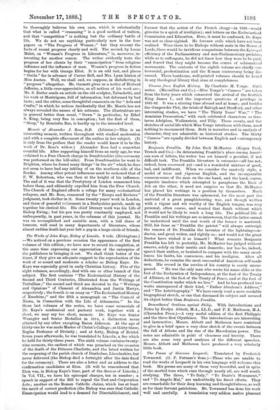The Works of John Kaye, Bishop of Lincoln. 8 vols.
(Rivingtons.) —We noticed on a previous occasion the appearance of the first volumes of this edition ; we have now to record its completion, at the same time expressing our appreciation of the enterprise of the publishers in bringing it out. We shall think better of the times, if they give an adequate support to the reproduction of the work of so sound and moderate a scholar as Bishop Kaye. Dr. Kaye was especially great in early Christian history. Five of the eight volumes, accordingly, deal with one or other branch of this subject. The first contains "The Ecclesiastical History of the Second and Third Centuries, Illustrated from the Writings of Tertullian ;" the second and third are devoted to the "Writings and Opinions" of Clement of Alexandria and Justin Martyr, respectively ; the fourth is an essay on "The Ecclesiastical History of Eusebins ;" and the fifth a monograph on "The Council of Nimes, in Connection with the Life of ..ithanasius." In the three last volumes of the series, we have some memorials of Dr. Kaye's academical and pastoral work, together with a short, we may say too short, memoir. Dr. Kaye was Senior Wrangler and Senior Medallist in 1814, a distinction never attained by any other excepting Baron Alderson. At the age of thirty-one he was made Master of Christ's College ; at thirty-three, Regius Professor of Divinity ; and at forty, Bishop of Bristol. Seven years afterwards, he was translated to Lincoln, a See which he held for thirty-three years. The sixth volume contains twenty- nine sermons, the earliest of which was preached on the occasion of the death of the Princess Charlotte, and the latest written for the reopening of the parish church of Dunholme, Lincolnshire, but never delivered (the Bishop died a fortnight after the date fixed for the ceremony). There are also a letter and an address to the confirmation candidates at Eton. (It will be remembered that Eton was, in Bishop Kaye's time, part of the diocese of Lincoln.) In Vol. VII., we have his episcopal charges, ten in number ; a speech in support of the Bill to repeal the Test and Corporation Acts ; another on the Roman Catholic claims, which has at least the merit of correct prediction (the Bishop was sure that Catholic Emancipation would lead to a demand for Disestablishment, and foresaw that the action of the French clergy—in 1828—would give rise to a spirit of irreligion); and letters on the Ecclesiastical Commission and Education. Here, it must be confessed, Dr. Kaye was not so clear-sighted. He foresaw evils which have not been realised. Were there to be Bishops without seats in the House of Lords, there would be invidious comparisons between the Episcopal efficiency of the Parliamentary and non-Parliamentary prelates ; while as to suffragans, he did not know how they were to be paid, and feared that they might become the centre of schismatical movements. The contents of the eighth volume are chiefly con- troversial, predestination and the Roman controversy being dis- cussed. These handsome, well-printed volumes should be fiund in any theological library that aims at completeness.


















































 Previous page
Previous page